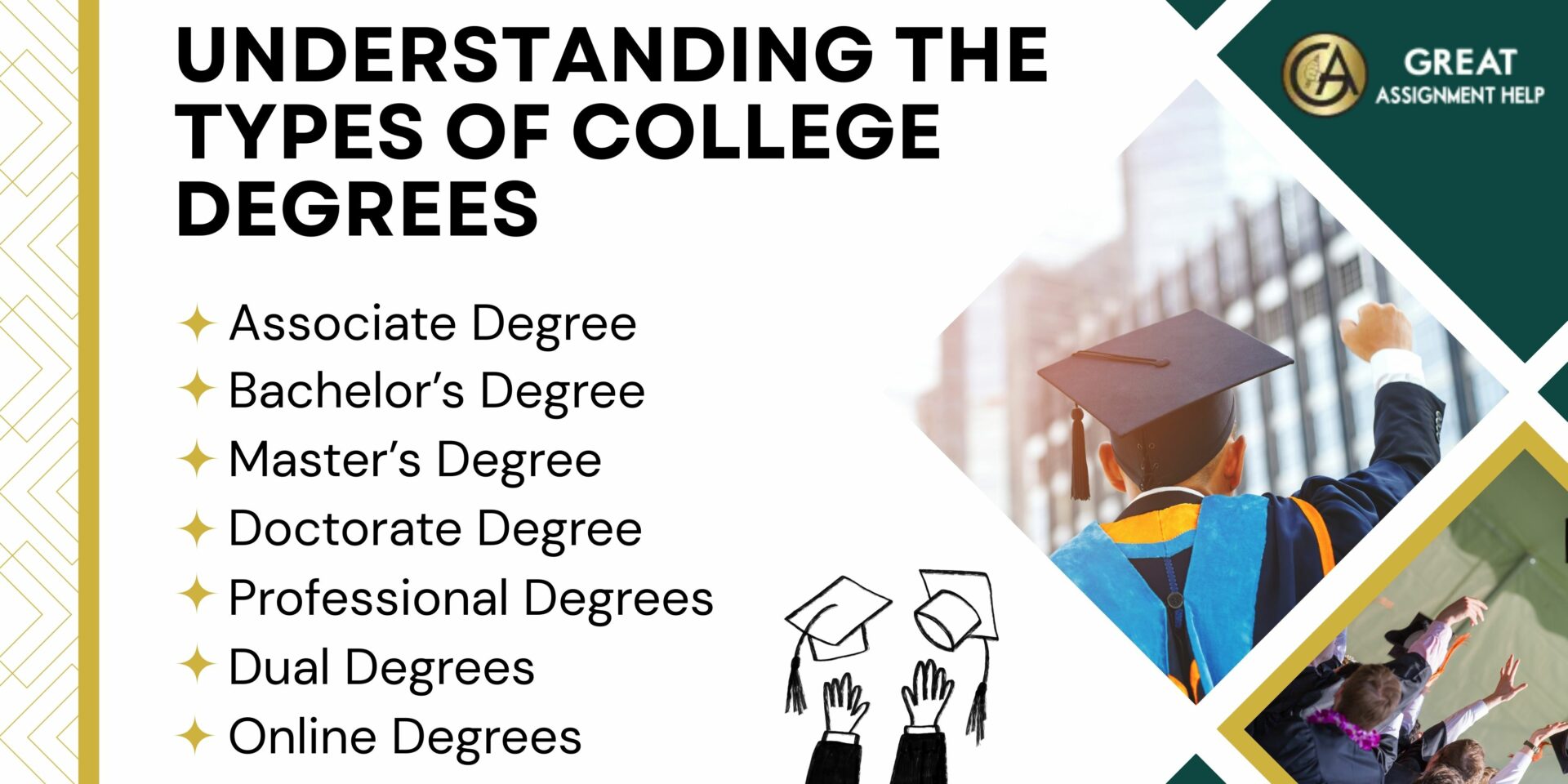There are various types of college degrees, including Associate’s, Bachelor’s, Master’s, and Doctoral degrees. Each type prepares students for specific careers, industries, or advanced education. Moreover, from two-year programs to PhD-level studies, understanding the different degree types can help students choose the right path for their future.
If you want to learn new skills and shine in your career, then you must first obtain a college degree. But there are different types of college degree options, from associate degrees to certificates and badges. So, you should make an informed decision after researching the qualifications required for your desired profession or field. No matter whether you wish to switch your career or get a job promotion, before applying for a degree, you should consider how it would help. For instance, you should look into how to progress through each level, how long programs take, and what kinds of degrees are available. This will give you a better idea of how to achieve your goals.
Especially to help you out, in this blog, we have shared an overview of the various types of college degrees and what is needed to pursue them. Continue reading this blog and get to know about the diverse study options.
Understanding the Types of College Degrees

As a prospective student, you will find many academic degrees and majors to choose from. Some can be started right after high school, while others require a first degree. Here, we will explore each type of college degree and its requirements
Associate Degree
Are you looking to start your higher education journey? If yes, then apply for an associate’s degree. It is an undergraduate degree that will take two years for you to complete. Typically, this degree falls under Associate of Arts (A.A.) for arts-focused studies or Associate of Science (A.S.) for science-focused studies.
The Associate’s degree can be a cost-effective option with smaller class sizes and hands-on learning. Based on your interest, you can pursue an associate’s degree in accounting, criminal justice, digital photography, IT, liberal arts, or marketing. These degrees are offered at universities, junior colleges, technical colleges, community colleges, and affiliated colleges.
Particularly, getting an associate degree will help you gain the knowledge, skills, and practical experience needed for entry-level jobs. Furthermore, you can smoothly transfer into a higher education program with an associate’s degree.
Bachelor’s Degree
To start your career in a specific field, you must complete a bachelor’s degree. It is a 3- or 4-year undergraduate degree that will provide you with in-depth knowledge and skills for various career paths. You can pursue a bachelor’s degree without an associate’s degree.
Generally, a bachelor’s degree covers a broad range of subjects, from engineering to arts and sciences. You must obtain this degree because it is often required for other credentials. Some common types of bachelor’s degrees are Bachelor of Arts (BA), Bachelor of Fine Arts (BFA), Bachelor of Science (BS), Bachelor of Architecture (BArch), and Bachelor of Business Administration (BBA).
A bachelor’s degree can prepare you for a specific career and is often required for many professional jobs. With this degree, you can unlock more job opportunities and potentially earn a higher income.
Also Read- Why Should You Get a Second Bachelor’s Degree?
Master’s Degree
If you wish to take your education to the next level, then you can enroll for a master’s degree. A master’s degree stands as a higher level of academics. Typically, you will have to spend 1-3 years to complete a master’s degree.
When you pursue a master’s program, you will have to take advanced classes, work on research projects, and write a thesis. This will help you specialize in your field and boost your career prospects.
Some common master’s degrees include Master of Arts (MA), Master of Fine Arts (MFA), Master of Science (MS), Master of Business Administration (MBA), and Master of Education (M.Ed.)
Doctorate Degree
In case you would like to further move to the highest level in your education, then apply for a doctorate. It will allow you to dive deeper into your field and become a true expert. There are different types of doctoral degrees. So, make sure to pick the one that aligns with your career goals and interests.
If you pursue a doctorate, you will become a master of your subject and earn the title “doctor.” This degree type is all about advanced research and scholarly development. Doctor of Business Administration (DBA), Doctor of Education (EdD), Doctor of Law (JD), and Doctor of Philosophy (PhD) are some common types of doctorate degrees.
As a doctoral student, you can work either full-time or part-time while pursuing your degree. So, it can impact the duration it takes to complete your degree.
Professional Degrees
Are you seeking a career-oriented education? If yes, then you can choose to join a professional degree. Typically, professional degrees are designed to train you for a specific job that requires hands-on skills and real-world experience. Unlike traditional academic degrees, professional degrees will focus on practical training, and they will prepare you for the workforce.
To earn a professional degree, you should have completed a bachelor’s degree. Some programs will require a master’s degree for entry. The length of each professional degree might vary. But overall, it will aim to give you the knowledge, skills, and ethics you need to succeed in your chosen profession. This could be a field like medicine, law, or animal care.
Doctor of Medicine (MD), Doctor of Medicine in Dentistry (DMD), and Doctor of Judicial Science (SJD) are some professional degrees. Particularly, with a professional degree, you can develop the expertise and abilities required to excel in your career.
Dual Degrees
You can even consider pursuing a joint degree, also called a dual degree. This means you will have to study for both a bachelor’s degree and a graduate degree at the same time. You can get a dual degree within the same college or split it between two different colleges. When you choose this option, you will get a chance to earn two degrees faster, save time, and boost your education.
Online Degrees
If you are looking for a flexible way to earn a degree, then you can apply for an online degree. This degree type is perfect for busy students or those who work full-time because it will allow you to complete your coursework, assignments, and tests from the comfort of your own home. Also, you won’t have to attend traditional classes. Especially when you enroll for an online degree, you can study at your own pace and on your schedule.
Besides degree programs, you have other options to achieve career success. You can consider apprenticeships, job training programs, skills training, military service, or entering the workforce directly to learn and grow.
The Bottom Line
Choosing the right college degree can greatly impact your career and life. Each type of degree has its benefits, so consider factors like program length, cost, and job market demand to find the best fit for your goals. Moreover, to obtain a degree, you must have to complete numerous assignments, homework, and projects. If it is challenging for you to complete your academic tasks, you can reach out to GreatAssignmentHelp. The subject professionals from our team will offer you high-quality assignment help so you can accurately finish your tasks on time and obtain your degree.



